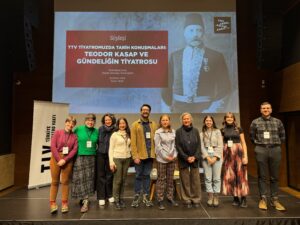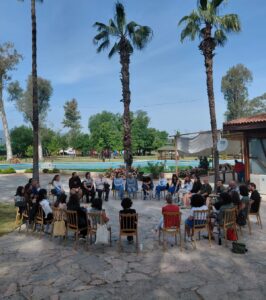Based in Diyarbakır, the Children First Association (Önce Çocuklar Derneği) works to support the psycho-social, cultural, linguistic, cognitive, physical, and artistic development of children. Supported through the Institutional Fund, launched in partnership with the Support Foundation for Civil Society and the Dalyan Foundation in 2024, the association focuses on strengthening financial sustainability and diversifying its resources.
Read the interview below to find out more about their work, the challenges in the field of children’s rights, and their experience with resource generation and development in the civil society sector.
Can you tell us about the mission and activities of the Children First Association?
Our association was founded in 2017 in Diyarbakır by a group of human rights defenders. Guided by the UN Convention on the Rights of the Child, our mission is to support children’s psycho-social, cultural, linguistic, cognitive, physical, and artistic development, while encouraging collaboration among individuals and institutions working in these areas.
We focus particularly on the right to mother tongue education, developing new tools in native languages, and supporting children’s cultural rights and development. Our primary target group is children from disadvantaged backgrounds who face barriers to equal opportunities.
In 2023, following the earthquakes and our field research, we revised our goals and areas of work to better respond to emerging needs. We formed a new board and adopted our 2024–2026 Work Plan, which now includes activities such as:
- Organising technical and scientific workshops and seminars to help children adapt to the digital and scientific age,
- Combating child labour, and
- Supporting migrant and refugee children.
We have also expanded our focus to include child and adolescent health, as well as sexual and reproductive health, especially for children, young people, and parents affected by the earthquakes.
In socio-economically disadvantaged regions like Diyarbakır, violations of children’s rights are felt much more deeply.
How would you describe the situation of children’s rights in Diyarbakır? What are the main challenges children face in the region?
While structural problems in the field of children’s rights persist across Türkiye, in socio-economically disadvantaged areas such as Diyarbakır these challenges are even more acute. Data from TÜİK and UNICEF confirm this.
Children here face a range of interlinked challenges — poverty, unequal access to education, rising substance abuse, child labour, and limitations on the right to mother tongue education. There is also a serious lack of cultural, artistic, and scientific opportunities to support children’s psycho-social development.
Safe and inclusive spaces for children are limited; gender roles and social pressures further restrict their freedom and well-being. The absence of accessible mental health support mechanisms makes it even harder to protect children’s rights. Many children are forced into early employment or drop out of school, while girls face additional barriers to education.
Following the earthquakes, ensuring safe living conditions and access to education became even more challenging, while available psycho-social support mechanisms proved largely inadequate. Although there is no updated data yet, we believe that school dropout rates have increased. The deepening economic crisis has exacerbated these problems, leading to higher rates of substance abuse, child labour, and child poverty.
As the crisis continues, families struggle even to meet their children’s basic needs, let alone access cultural and artistic activities. The need for long-term programmes that can support children’s healthy development and recovery from trauma is greater than ever.
Addressing these challenges requires rights-based, participatory, and culturally sensitive approaches that respond to local needs. Civil society organisations, public institutions, and local authorities must work together to develop sustainable solutions.
Short-term projects can disrupt the process and weaken the trust we build with children.
How does the lack of resources in the civil society sector affect your work? What are your experiences and observations on collaboration and resource diversification?
In 2025, we implemented six projects, which helped us take important steps in resource generation. However, as projects have limited lifespans, they cannot provide a permanent or sustainable solution. This reflects a broader challenge across civil society — insufficient and unstable funding — which continues to pose a risk to our organisation as well.
In the field of children’s rights, continuity and trust are essential. Our work is based on long-term relationships with children, and short-term projects interrupt these processes, weakening the bonds we form and undermining trust.
When projects end, we often struggle to cover core costs such as rent and utilities, or to retain our staff, which leads to a loss of experience and continuity. Moreover, we are frequently compelled to align our programmes with available grant calls instead of our own needs-based priorities in children’s rights.
Despite these challenges, we have seen promising developments through new local, national, and international collaborations. In 2024, for the first time, we partnered with the Diyarbakır Chamber of Commerce and Industry, securing resources for our activities. We also worked with a brand, Beije, to provide hygiene kits. Moreover, our first international partnership with the Catalan Agency for Development Cooperation opened up new opportunities to explore alternative funding models. Expanding and sustaining such partnerships is now one of our main priorities.
Expanding our financial resources is one of our core priorities.
What areas are you focusing on with the grant and capacity-building support you received?
Our main focus is financial sustainability. The ongoing economic crisis in Türkiye and globally has made it increasingly difficult for civil society organisations to sustain their work. Strengthening our financial base has therefore become a top priority.
With the support of this fund, we are conducting a financial assessment to identify needs and prepare a roadmap for improvement, which will guide our long-term institutional strengthening efforts.
We are also working on building a qualified volunteer pool and developing strategies for sustainable volunteer engagement, which we see as a key part of our broader financial sustainability plan.
We don’t just tell the story of change — we write it together.
Finally, how would you describe your impact to those who might wish to support your work?
In 2024, we established a culture and arts centre in Kömür, Adıyaman, where we organised four months of workshops in music, theatre, and creativity with children. At the end of the project, we held a two-day festival where the children showcased their performances.
During the first week of the music workshops, one child quietly observed from the sidelines. The day before the festival, that same child asked to go on stage and sing a solo song. For us, that moment captured everything we stand for.
We don’t just tell the story of change — we write it together.







